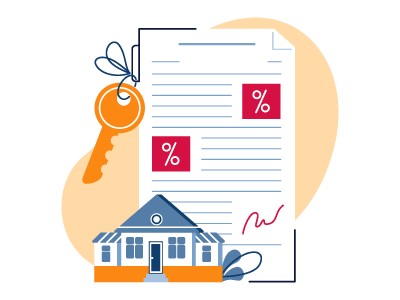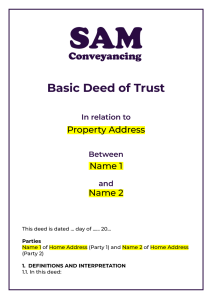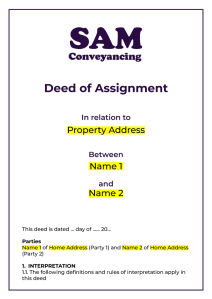What is a Declaration of Trust for Property?
For couples, friends, or family buying property together, especially when contributions are unequal or circumstances require formalisation (like parents gifting deposits or cohabiting partners), clearly defining ownership shares and future arrangements is crucial. This is where a Declaration of Trust comes in, it's an agreement that outlines how a property is owned when there are multiple beneficial owners.
However, not all declarations of trust offer the same level of legal protection; the gold standard is a Deed of Trust. Think of a Deed of Trust as a legal book, and the Declaration of Trust is a vital chapter within it. It's the specific part where the parties formally declare their beneficial ownership shares in the property, but the Deed itself contains much more.
It makes the declaration legally binding, including additional clauses regarding contributions, responsibilities, future sale plans (including how to force a sale), and protects against third-party claims. Without a Deed, disputes can easily arise, leaving your investment vulnerable.
What does a Declaration of Trust mean in property?
A Declaration of Trust in property is a formal, legally binding document that specifies the beneficial (equitable) ownership of a property, particularly when it differs from the legal ownership registered at the Land Registry.
It outlines who owns what share of a property and, if applicable, how financial contributions such as mortgage payments or proceeds from a sale are divided between owners. This makes it easy to verify who legally gets what when the property is sold.
The difference between a Declaration of Trust and a property being held 'on trust'
While a 'trust' broadly refers to a legal arrangement where property is held by one party for the benefit of another, a 'Declaration of Trust' is the specific document that formally records these beneficial ownership arrangements for a property.
For example, legal owners might hold the property on trust for themselves in differing shares (e.g., one owns 40%, another 60%), or for other beneficial owners (such as holding the property on trust for a child until they reach a certain age).
Protect your interest in a property and confirm how to sell. Drafted by a solicitor.
The first draft is within 1 to 2 working days* and includes:
- Deposit paid.
- The percentage ownership of each party.
- How to share expenses like the mortgage and bills.
- Share of property income - rent or gain on sale.
- How to sell the property.
- How the property is divided in the event of separation, divorce, or death.
What is included in a Declaration of Trust?
A basic Declaration of Trust will clearly outline the fundamental details of the trust arrangement. This typically covers:
- The intention between the parties to create a trust.
- A clear identification of what is being held on trust (this is normally the specific property address).
- Who holds the beneficial interest and the specific shares in which it is held (e.g., 50/50, 70/30). A declaration of trust is particularly used when beneficial interests differ from legal ownership, thus clearly stating the split is a primary function.
Who drafts the declaration?
A Declaration of Trust is drafted by the owners of the property. A Deed of Trust is drafted by a professional solicitor and is much more valuable if you need to enforce the terms. It is important to note that the declaration:
- Does not transfer the legal title.
- Is not a deed and no reference to a deed can be included on the document.
- Is not signed by the beneficiaries, but signed by the legal owner/s only.
- Is not witnessed (like a deed).
- Is not registered as a restriction at the Land Registry.
- Can be back-dated (unlike a Deed of Trust), subject to evidence being provided to demonstrate that the trust was in existence before it was drafted - If you have previously declared income from the property in different beneficial shares in the past, you cannot backdate the declaration.
Can a Declaration of Trust be challenged?
Yes, a Declaration of Trust can be challenged. Common grounds for challenging such a document include:
Fraud or Misrepresentation
If it can be proven that a party was misled or provided false information to induce the creation of the trust, the declaration can be challenged.
Undue Influence
If one party exerted undue influence over another to create the trust, the declaration may be set aside.
Lack of Mental Capacity
If a party lacks the mental capacity to understand the nature and effect of the trust, the declaration may be invalid.
Mistake
If there was a mistake in the creation of the trust, the terms, or the identity of the beneficiaries, the declaration may be challenged.
For a declaration (especially one not formally executed as a Deed) to be considered 'legally binding', it usually requires:
- It is drafted by the legal owner.
- The legal owner has a right to transfer the beneficial interest in the property.
- The property is held solely or as Tenants in Common.
- It is not made to avoid bankruptcy proceedings or for any criminal activity.
However, an informal declaration often does not provide the same level of protection or enforceability as a Deed of Trust.
For example, if there's no restriction registered at the Land Registry (which is common with informal declarations), a beneficial owner may have no rights to stop a sale by the legal owner, nor might they be made aware of it.
Protect your interest in a property and confirm how sale proceeds will be divided with a Deed of Trust or a Floating Deed of Trust.
The first draft is often within 1 to 2 working days, often within hours of instruction. The deed includes:
- Deposit paid, costs of purchase, mortgage repayments and renovations.
- How to share property expenses, including the mortgage and bills.
- Share of property income - rent or gain on sale.
What is the difference between a Deed of Trust and a Declaration of Trust?
While all Deeds of Trust contain a Declaration of Trust (detailing beneficial ownership), not all declarations of trust are formal Deeds. The fundamental differences lie in their legal formality, enforceability, scope, and the extent of protection they offer:
Feature | Declaration of Trust | Deed of Trust |
|---|---|---|
Feature Legal Formality and Execution | Declaration of Trust Often drafted and signed by the legal owner(s) without needing a solicitor for its preparation or formal witnessing. It's generally a less formal document between parties. | Deed of Trust A formal legal agreement signed as a deed in front of witnesses to ensure its validity and enforceability. This makes it a much stronger document if you ever need to legally enforce any of its terms. See how to execute a deed. |
Feature Scope and Included Clauses | Declaration of Trust Primarily states only the beneficial interest split of the property. | Deed of Trust Includes the declaration of beneficial ownership, but goes much further. It incorporates comprehensive, legally binding clauses detailing how the property is to be held, its purpose, how joint owners will manage expenses (like mortgage repayments and bills), how they will handle a future sale (including mechanisms for resolving disputes or one owner buying out another), and any restrictions stopping certain actions without mutual agreement. |
Feature Land Registry Registration and Protection | Declaration of Trust Typically not registered as a restriction at the Land Registry. This means beneficial owners may lack public record of their interest and cannot easily prevent transactions by legal owners acting unilaterally. | Deed of Trust Can (and should) be registered as a restriction (e.g., Form A) against the legal title at the Land Registry. This publicly protects the interests of beneficial owners, especially if one isn't a legal owner, by ensuring certain transactions (like a sale) cannot proceed without their knowledge or compliance with the Deed's terms. |
A Deed of Trust offers significantly greater protection for all parties, particularly a beneficiary who is not registered on the legal title. The vast majority of trusts for property are drafted and executed as a Deed of Trust to ensure maximum legal certainty and enforceability.
How a Deed of Trust affects you
Do you need to register a Deed of Trust with HMRC?
Whether you need to register the trust with HMRC (via the Trust Registration Service) depends on how it's set up and who's involved.
If different people own the property legally and beneficially (i.e., it's an express trust where the legal owners are not the only beneficial owners, or the beneficial shares differ from legal shares), you need to register it with the tax office.
HMRC Form 17 should be completed and sent to HMRC for married couples who want to share property income in unequal shares.
What if I'm a Tenant in Common?
A Deed of Trust is specifically designed for properties held as Tenants in Common. You cannot have a Deed of Trust if the property is held as joint tenants, because joint tenancy implies equal, undivided ownership where the property automatically passes to the surviving owner (right of survivorship), making a declaration of specific shares redundant.
If your property is currently held as joint tenants, you must first sever the Joint Tenancy to become Tenants in Common. Your solicitor can handle this for you when they draft your Deed of Trust and register it with the Land Registry.
Change from Joint Tenants to Tenants in Common with a Deed
Severing a joint tenancy and formalising your beneficial ownership with a Deed of Trust provides clarity and protects the interests of all parties, offering robust evidence for tax purposes and future arrangements.
We can draft your Deed of Trust for this purpose in one to two working days for just £535 INC VAT.
Once finalised, your solicitor will submit the necessary application to the Land Registry to sever your joint tenancy and register any relevant restrictions from the Deed.
Share rental income or transfer property ownership quickly and easily with a Deed of Assignment.
Get your first draft within 1-2 working days*.
Our experienced solicitors draft deeds for various purposes, from buy-to-let transfers to protecting your interest in the family home.
- Transfer rental income efficiently.
- Assign Capital Gains securely.
- Transfer full or partial ownership seamlessly.
How much does a Declaration of Trust cost?
While some conveyancing solicitors may draft you a basic Declaration of Trust ranging from £240 to £50,0 INC VAT, these lack the robust clauses and formal execution of a Deed.
At SAM, we specialise in drafting comprehensive Deeds of Trust for joint owners looking to outline their intentions with a property. For a similar cost, you get a much more extensive and legally secure agreement.
This agreement outlines not only the precise division of the deposit and equity but also covers ongoing contributions to mortgage repayments, clarifies what happens in case your relationship changes or breaks down, and specifies the steps to take if you need to sell the property but cannot reach an agreement.
Our basic Deed of Trust fixed fee starts from £304 INC VAT and we can return the first draft within 1-2 working days(i). We always offer a Deed of Trust rather than a mere informal Declaration of Trust, ensuring you receive the highest level of legal protection and clarity.
Book a FREE* 15-minute meeting with a property dispute specialist who will listen to your issue and suggest ways forward, including the costs, with no obligation to use our services after the free meeting.
- What are you due on sale?
- How to sell where one person doesn't want to.
- Mediation and Settlement Agreements.
- Applications to court, including Declaratory Orders, Regulatory Orders, Occupational Rent.
Andrew started his career in 2000 working within conveyancing solicitor firms and grew hands-on knowledge of a wide variety of conveyancing challenges and solutions. After helping in excess of 50,000 clients in his career, he uses all this experience within his article writing for SAM, mainstream media and his self published book How to Buy a House Without Killing Anyone.
Caragh is an excellent writer and copy editor of books, news articles and editorials. She has written extensively for SAM for a variety of conveyancing, survey, property law and mortgage-related articles.













